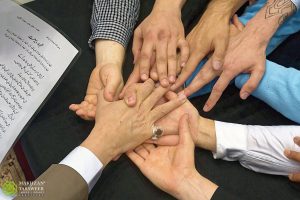
Qasim Choudhary, USA
Very soon on our social media feeds, #Ramadan will be replaced with #EidMubarak. Pictures of prayer mats and iftars (meals to open the fast) will be swapped out for elegant henna designs and fancy outfits. But there is so much more to this jubilant day than the delicious meals, new clothes and of course, the unspoken but universal afternoon nap.
Here are five things you probably didn’t know about Eid:
1. What Does the Word Eid Mean?
The mainstream definition of Eid is often termed as being a day of happiness. However, in the Arabic language, it refers to something which is oft-returning. Since happiness is something we all desire, this points towards man’s innate desire to seek out this day. Similarly, the word عید is derived from عود. In Arabic there is a proverb which reads, اَلْعَوْدُ اَحْمَدُ, meaning a thing which returns a second time is superior. [1]
2. Eid & Contentment
On the day of Eid, there are generally two kinds of people. Those who are somewhat happy and those who are truly content. The Second Caliph of the Ahmadiyya Muslim Community, Hazrat Mirza Bashiruddin Mahmud Ahmad (ra) expounds on this subject when he states,
‘Eid is determined by the happiness of the heart. Though the superficial festivities hold minor benefit, Eid remains contingent upon the heart. The heart cannot perceive true happiness without contentment. Contentment cannot exist where fear prevails. One cannot be safeguarded from fear until he has full certainty of a guardian who cannot be challenged. That guardian is none other than God Almighty. Thus, true Eid is that one becomes certain that God is pleased with me.’ [2]

Continuing, Hazrat Hazrat Mirza Bashiruddin Mahmud Ahmad (ra) poses a pertinent question. He states,
‘I ask to those who say today is Eid and are visibly happy, what difference is there today versus yesterday. Today is very much like yesterday. Are we joyous because today we are well-dressed? Or perhaps that we have prepared exquisite meals. If this is true, were we not able to dress well yesterday? Were we not capable of cooking and eating delectable meals yesterday? Then why are we happy today? Is it because we have congregated? Were we not able to assemble the day before? Indeed Eid is a day of happiness, but only for those who fulfilled their obligations owed to God.’ [3]
3. Superficial Eid & The True Eid
Hazrat Mirza Bashiruddin Mahmud Ahmad (ra) draws our attention towards the true Eid which includes the Holy Prophet (sa). He states, ‘This day we are obliged to be happy and celebrate. However, our hearts should still be in a state of grief, because the Eid of the Holy Prophet (sa) and Islam has not yet come into fruition.The Eid of Islam and the Holy Prophet (sa) will not be realized by simply eating sweet vermicelli and sheer khurma, rather their Eid will occur by disseminating the Qur’an and Islam. If we can achieve this, then the Holy Prophet (sa) will participate in our Eid and will be joyful seeing that his nation has upheld his mission.’ [4]
4. True Eid Does Not Cease
Statutory holidays around the world are confined to time. As the clock strikes 12 the ornaments and festivities come to a halt. But what If I told you that Eid transcends time and space. Hazrat Mirza Bashiruddin Mahmud Ahmad (ra) commenting on this matter states, ‘Eid is to reconcile with God and forge a bond with him. When this Eid transpires it does not expire. It has no dawn nor can time abolish it or bring it to a close. That Eid does not conclude in this world nor in the grave. It does not cease in the world to come. It starts in this very world and reaches its zenith in the next.’ [5]
5. Ingrained in Human Nature
Christmas, Hanukkah, or Diwali are all examples of mankind’s innate desire to celebrate and congregate. Islam recognizes the inextricable link of celebration with human nature. Apart from the two major Eid’s celebrated by Muslims in the year. The Holy Prophet (sa) has also referred to Friday as a day of Eid. [6] Since time immemorial, we observe all nations celebrating in one way or another. But why?
Hazrat Mirza Bashiruddin Mahmud Ahmad (ra) addressing this question states,
‘If man were to only dwell on his sorrows and hardships it would diminish his strength. Occasionally, we need to focus on our success which further strengthens our resolve.’ [7]

©Shutterstock
Furthermore, he states,
‘Our nature desires to distance itself from burdens and grief and to experience happiness. Thus, it was necessary to have a day in which man could unburden himself by dressing up and interact with people. However, Islamic Eid and the celebratory days of other nations are vastly different. Imagine a person is suffering from dehydration and they are presented with warm water. Although it may relieve his thirst short-term, he will not be fully satisfied. However, shouldn’t the rationale of the person presenting the warm water be put into question. He should have given him something that would fully quench his thirst. In the same manner, other nations commemorate their celebratory days in a temporary fashion that ultimately harms them. They indulge in drinking, dancing, and other vain pursuits. Whereas Islamic celebration satiates the soul not short-term but everlasting happiness. Normally we observe five daily prayers, but today it will be six. We wear new clothes, apply fragrance, and cook delicious meals. But why? Because on this day, we are afforded an additional opportunity to worship God. This is Eid.’ [8]
About the Author: Qasim Choudhary is a graduate from the Ahmadiyya Institute of Languages and Theology in Canada, and serves as an Imam of the Ahmadiyya Muslim Community in the United States of America.
ENDNOTES
[1] Khutbat-e-Mahmud (Eid-ul-Fitr), Vol.1, pg. 499, April 10, 1959
[2] Khutbat-e-Mahmud (Eid-ul-Fitr), Vol.1, pg. 25, August 13, 1915
[3] Khutbat-e-Mahmud (Eid-ul-Fitr), Vol.1. pg. 92-93, May 29, 1922
[4] Khutbat-e-Mahmud (Eid-ul-Fitr), Vol.1, pg. 489, May 2, 1957
[5] Khutbat-e-Mahmud (Eid-ul-Fitr), Vol.1, pg. 85, June 8, 1921
[6] Sunan Abu Daud, Baab Iza Waafiq Yaum-ul-Jumma-Yaum Eid
[7] Khutbat-e-Mahmud (Eid-ul-Fitr), Vol.1, pg. 425, July 28, 1949
[8]Khutbat-e-Mahmud (Eid-ul-Fitr), Vol.1, pg. 18-20, August 13, 1915




Add Comment